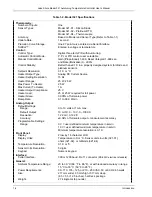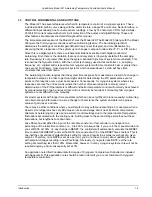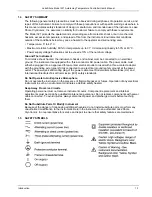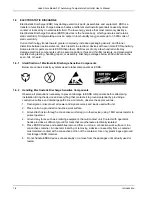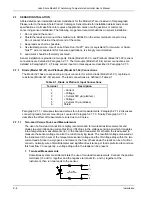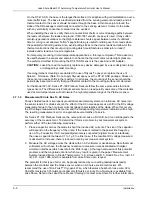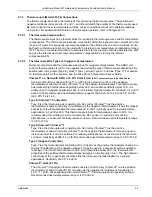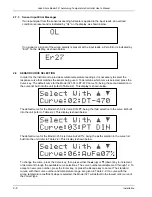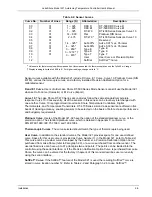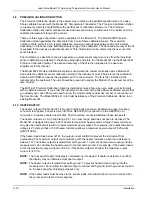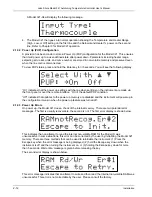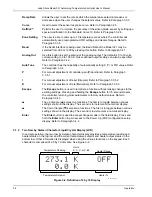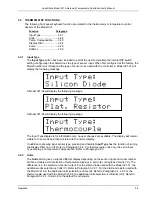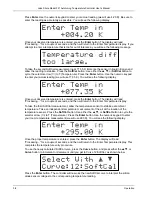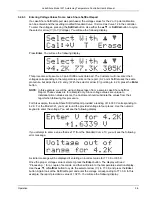
Lake Shore Model 321 Autotuning Temperature Controller User’s Manual
2-10
Installation
2.9 PRECISION
CALIBRATION
OPTION
The Precision Calibration Option is the easiest way to combine the additional performance of a Lake
Shore calibrated sensor with the Model 321 Temperature Transmitter. The Precision Calibration Option
is a read-only memory chip (PROM) with specific sensor calibration stored on it. The Precision
Calibration Option improves combined sensor/instrument accuracy to within ±0.25 K or better over the
calibrated temperature range of the sensor.
There are three types of precision options available for the Model 321. The Model 8000 Precision
Calibration Option generates the data table from a Lake Shore calibrated sensor. The maximum
number of data points is 99. A typical calibration precision option ranges between 30 and 40 points
depending on the sensor type and temperature range of the calibration. The data and accuracy of the fit
is supplied to the user as a separate document. This information can be entered by the user over the
serial interface.
Prior to shipment, Lake Shore can also generate a custom sensor response curve from the individual
sensor calibration as indicated in the above paragraph and store it in the Model 321 via the Model 8001
Precision Calibration Option. The data and accuracy of the fit is then supplied to the user as a
supplement to this manual.
The Model 8002 Precision Calibration Option is used when the customer already owns a Model 321
and wants the additional sensor calibration stored in the instrument. Lake Shore stores the calibration
data in a NOVRAM and sends the programmed IC to the customer. The IC is then installed in the
instrument by the customer. The user should be prepared to supply the Model 321 serial number at the
time of order.
The 8001-321 Precision Calibration Option is installed at Lake Shore when you order your instrument
with a calibrated sensor. If you order the instrument to be used with a Lake Shore calibrated sensor that
you already own, Lake Shore will need to know the model number and serial number of your sensor at
the time of order. The Model 8002-321 is for field installations of the Precision Calibration Option in an
existing Model 321.
2.10 HEATER SETUP
The heater output of the Model 321 is brought out the back panel as a Dual Banana Jack. A mating
connector is supplied. Current is driven from the HEATER (HI) connection to the HEATER (LO)
connection. A resistive heater load of 25
Ω
, 25 W should be connected between these two points.
The heater output is a 1 A on High range, 0.31 A on Low range, and does not have to be fused. The
Model 321 is designed to power a 25
Ω
heater for maximum heater output. A larger heater resistance
may also be used but will result in a lower maximum power output. For example, the output compliance
voltage is 25 volts so that a 100
Ω
heater resistance allows a maximum power output of 6.25 watts
[(25V)
2
/100
Ω
].
If the heater load drops below
≈
21
Ω
, the output current will limit to prevent the instrument from
overheating. The maximum output current will drop with the heater resistance when the resistance is
below 21
Ω
. The heater output is isolated from earth ground. To prevent heater noise coupling into the
measurement, do not allow the heater output to contact earth ground. For example, if the heater load is
20
Ω
, the maximum output current is
≈
0.90 A. If the heater output is shorted, the maximum output
current is
≈
0.30 A.
NOTE:
The front panel Heater % display is calculated, not measured. If heater resistance is not 25
Ω
,
the display may not indicate actual heater output.
NOTE:
The heater output is isolated from earth ground. To prevent heater noise coupling into the
measurement, do not allow the heater output to contact earth ground. Earth ground is provided
on the back panel for shielding purposes only.
NOTE:
If the heater leads must be close to the sensor leads, wind (twist) them in such a manner that
they cross each other at ninety degrees.

